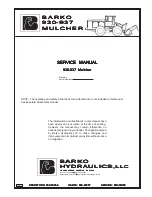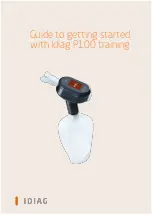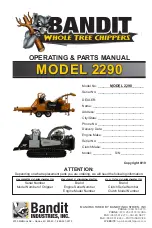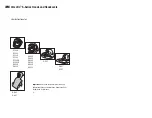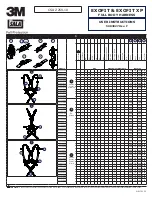
920-0003-00 Rev. B
Page 3 of 5
Notes:
1. Larger wires and tight connections will provide longer service life for components. For high current wires it is highly
recommended that terminal blocks or soldered connections be used with shrink tubing to protect the connections.
Do not use insulation displacement connectors (e.g., 3M Scotchlock type connectors).
2. Route wiring using grommets and sealant when passing through compartment walls. Minimize the number of
splices to reduce voltage drop. High ambient temperatures (e.g., under-hood) will significantly reduce the current
carrying capacity of wires, fuses, and circuit breakers. All wiring should conform to the minimum wire size and other
recommendations of the manufacturer and be protected from moving parts and hot surfaces. Looms, grommets,
cable ties, and similar installation hardware should be used to anchor and protect all wiring.
3. Fuses or circuit breakers should be located as close to the power takeoff points as possible and properly sized to
protect the wiring and devices.
4. Particular attention should be paid to the location and method of making electrical connections and splices to
protect these points from corrosion and loss of conductivity.
5. Ground termination should only be made to substantial chassis components, preferably directly to the vehicle
battery.
6. Circuit breakers are very sensitive to high temperatures and will “false trip” when mounted in hot environments or
operated close to their capacity.
Wiring Instructions:
Important:
Disable power before wiring up the bar.
Important:
This unit is a safety device, and it must be
connected to its own, separate fused power point to
assure its continued operation should any other electrical
accessory fail.
The 6221000 series lightbar is designed to operate on a 12
VDC negative ground system. Use 16 AWG (UL 1015) or
larger wires. If the wire is to be exposed to a high tem-
perature environment, use 16 AWG (UL 3265 grade min.)
type wire. Connect the black lead to the vehicle chassis,
or preferably the negative terminal of the battery. Bring the
red lead to the user supplied control switch, and then to
the battery or to the battery side of the starter solenoid or
alternator. Install a 12 Amp 3AG SLO-BLO fuse to protect
the vehicle’s wiring system against shorts. See Figure 3.
The motor will rotate in a clockwise direction (when looking
down on the unit from above).
12 AMP 3AG SLO-BLO FUSE
(USER SUPPLIED)
SWITCH
(USER SUPPLIED)
GROUND
GROUND
RED
BLACK
Figure 3
NOTE:
Operating the vehicle without the outer lens in-
stalled on the product may result in damage that will NOT
be covered under the warranty.







